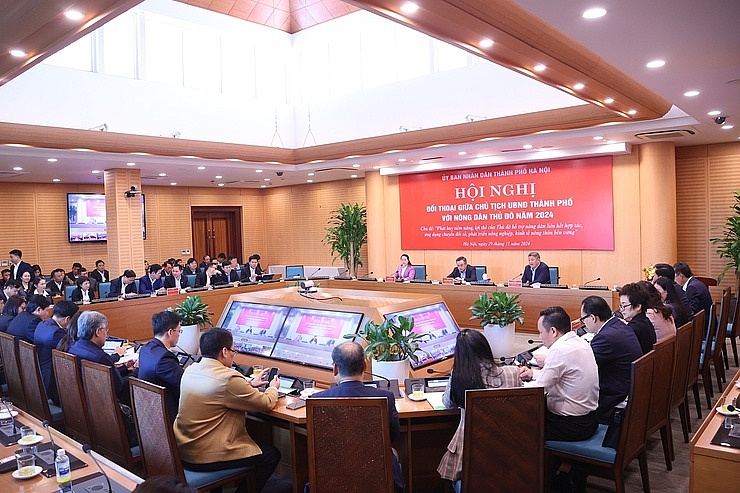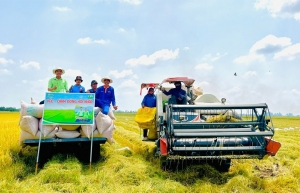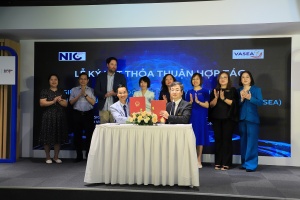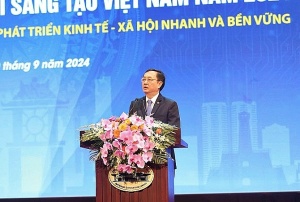Hanoi aims for sustainable agriculture through innovation
At a conference held by Hanoi People's Committee for the city's farmers on November 29, Chairman Tran Sy Thanh highlighted the city’s commitment to its agricultural sector.
The conference also addressed policies, such as a Party Central Committee resolution on improving the role of the Vietnam Farmers' Union and the prime minister's approval of a plan to promote its participation in collective economic development in agriculture.
“Hanoi places special focus on developing agriculture, farmers, and rural areas,” Thanh said. “Agriculture, farmers, and rural areas play a pivotal role in the nation’s development. Farmers are both the driving force and the beneficiaries of the city’s progress.”
 |
| The conference between Hanoi People's Committee and the city's farmers on November 29 |
Pham Hai Hoa, chairwoman of the Hanoi Farmers’ Association, reported significant strides in improving the rural economy.
Between 2023 and 2024, 62 per cent of Hanoi farmers met the standards in advanced agricultural techniques, and 206 local-level farmers' clubs were established to encourage knowledge-sharing and mutual support.
Additionally, the union has conducted training for over 250,000 farmers in advanced agricultural techniques, and offered legal advice for over 53,000 members. Moreover, 792 new cooperative groups and 59 cooperatives have been established, with 27 agricultural value chains formed to ensure sustainable production and distribution.
Digital transformation has also been a key focus. Collaborating with entities such as Hanoi Post and VNPT Hanoi, the union has facilitated e-commerce participation, with 1,871 OCOP-certified products from 54 businesses showcased on Postmart.vn. Furthermore, 67 safe agricultural product outlets have been launched across the city.
Hanoi's agricultural export value reached $1 billion in 2023 and surpassed $800 million in the first half of 2024, indicating strong potential for exceeding last year’s figure. Handicrafts have also performed well, with Hanoi Department of Agriculture and Rural Development facilitating Van Phuc and Bat Trang villages’ inclusion in the global network of handicraft villages.
In his concluding remarks at the conference, Thanh underscored the need for Hanoi's farmers to embrace a forward-thinking mindset. “Farmers must think bigger and act bigger, not just catering to the city's 10 million residents but targeting global markets,” he said.
Thanh laid out an ambitious vision for Hanoi's agriculture sector, aiming for clean, sustainable farming practices by 2030, encompassing soil, water, and air quality improvements. He emphasised the importance of creating unique narratives for agricultural and handicraft products, backed by the prestigious “Made in Hanoi” certification.
Furthermore, Thanh called for the elimination of outdated practices, advocating for environmentally friendly methods that contribute to the city's brand as a hub of clean agriculture. “The days of ‘two types of vegetables and two types of pigs’ must end. We need unified, sustainable practices,” Thanh said.
He also proposed introducing retirement benefits and universal healthcare coverage for farmers by 2030 to improve their quality of life, highlighting the state's role as a facilitator.
“While challenges remain, inaction is not an option. The government will act as a supportive partner, but the responsibility for transformation lies with the farmers themselves,” Thanh said. “Every farmer in Hanoi should see themselves as part of the capital's identity and create a meaningful difference.”
This strong commitment, Thanh added, will empower farmers and rural areas to rise to the demands of the new era, ensuring that Hanoi's agricultural sector continues to grow with global trends.
 | Sustainable agriculture and the indispensable human factor If a country wants to develop a sustainable agriculture, it cannot ignore the human factor, especially the farmers in the value chain. And in Vietnam, a number of leading enterprises in the agricultural sector have been deeply involved in the value chain with practical and effective solutions. |
 | Promoting green innovation in agriculture Green agriculture is emerging as the optimal direction for the sector in Southeast Asia, as the region faces environmental and climate change challenges. |
 | Hanoi sets sights on becoming innovation hub Hanoi is not only Vietnam’s political and economic centre but also a leader in science, technology, and innovation, both nationally and regionally. |
What the stars mean:
★ Poor ★ ★ Promising ★★★ Good ★★★★ Very good ★★★★★ Exceptional
Related Contents
Latest News
More News
- SK Innovation-led consortium wins $2.3 billion LNG project in Nghe An (February 25, 2026 | 07:56)
- THACO opens $70 million manufacturing complex in Danang (February 25, 2026 | 07:54)
- Phu Quoc International Airport expansion approved to meet rising demand (February 24, 2026 | 10:00)
- Bac Giang International Logistics Centre faces land clearance barrier (February 24, 2026 | 08:00)
- Bright prospects abound in European investment (February 19, 2026 | 20:27)
- Internal strengths attest to commitment to progress (February 19, 2026 | 20:13)
- Vietnam, New Zealand seek level-up in ties (February 19, 2026 | 18:06)
- Untapped potential in relations with Indonesia (February 19, 2026 | 17:56)
- German strengths match Vietnamese aspirations (February 19, 2026 | 17:40)
- Kim Long Motor and AOJ Suzhou enter strategic partnership (February 16, 2026 | 13:27)

 Tag:
Tag:




















 Mobile Version
Mobile Version